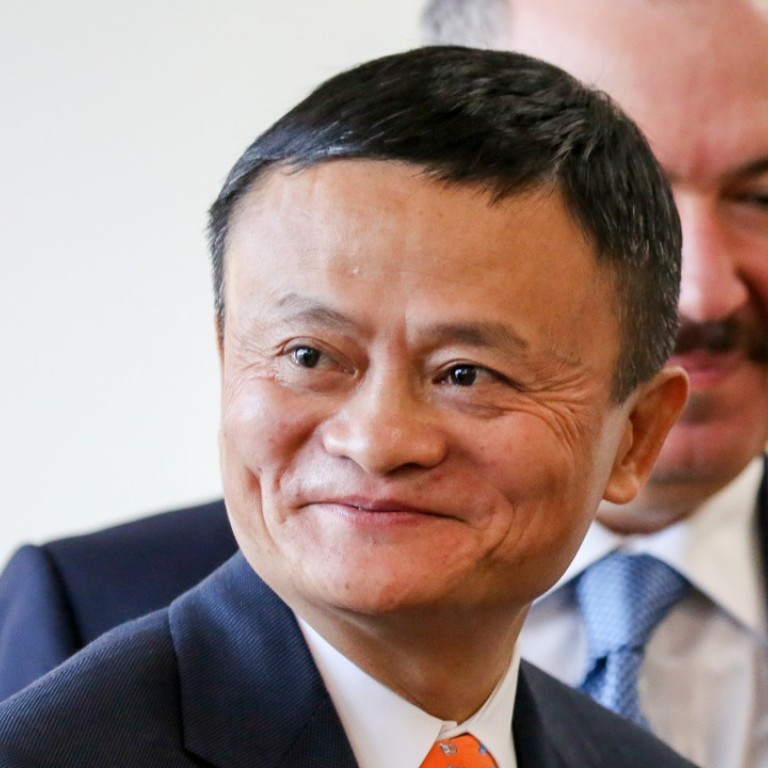
Jack Ma says it’s his responsibility to let Alibaba go, warns of protracted US-China trade war
On succession planning, Ma said that his decision to step down was to ensure leadership renewal
After Alibaba Group executive chairman Jack Ma announced a week ago that he will hand over the chairmanship to chief executive Daniel Zhang in a year’s time as part of succession planning, he received calls from all over the world.
Some asked whether he was crazy, stricken with disease, being brought down by the government, scared of the US-China trade war, or even whether “something like Minnesota is happening,” Ma said at the company’s annual investor event on Tuesday in Hangzhou, possibly referring to the arrest of JD.com founder Richard Liu Qiangdong in Minnesota on a rape accusation.
“I said no. To me, this is not today, this is a ten-year preparation.”
In a wide-ranging speech, Ma explained the rationale for his decision to step down, offered his thoughts on succession planning, the future of Alibaba and the US-China trade relationship.
Ma was the last speaker at the two-day event, which saw the heads of Alibaba’s various business units make presentations on their operations and plans.
On succession planning, Ma said that his decision to step down was to ensure leadership renewal. He also had other goals to achieve, such as philanthropy, especially in education.
“If I start to retire at 64 I don’t think I’ll retire, because if I retire at 64 I will have nothing to do, I’ll stay in the company all the time, torture all the young people like most of the old guys.”
To ensure the company can achieve its goal of lasting for at least 102 years, younger leaders need to be cultivated and brought to the fore, he said, using the analogy of a loving parent letting the child stand on his own.
“If you love the company, just like if you love your kid, you can teach him in kindergarten, in primary school, no problem, middle school, high school, university, let him go,” Ma said. “If you let him go, you really love the company. If you control it, you’re not loving the kids. It’s my responsibility to let the company go.”
He also warned that the trade friction between the US and China will be a protracted affair because it is about two countries competing with each other. Even if US President Donald Trump retires, and the next president comes on, the conflict will continue, he said.
“It’s going to be long-lasting, it’s going to be a mess, maybe 20 years,” Ma said. “Today China has become the second-largest economy in the world. This kind of thing happens, it’s very natural.”
Despite this, Alibaba will continue to strive to be “a company of globalisation,” Ma said. “Otherwise we will never choose the name Alibaba, we’d choose another crazy Chinese name that people don’t understand. We are called Alibaba because this company must be globalised.”
Still, global trade needs new rules, and the trade system has to include small businesses and not rely on the old model of being driven by big companies, Ma said.
In the medium term, a lot of Chinese businesses will move to other countries, while in the long term, China will have a new model. The country has to open up and have domestic reform, driven by domestic consumption, he said.
In terms of Alibaba’s future, Ma said that like a professional Go player, the company’s management is trying to think about “14 or 15 steps” ahead. A lot of the businesses that Alibaba has are “not for today but for the future,” Ma said, citing the example of New Retail, which nobody believed in when Alibaba first announced it two years ago, likewise the company’s push into new manufacturing.
“I am confident in Alibaba and the culture, the partnership is so unique and people so good, so no problem, don’t worry about that,” Ma said. “Because I will be a shareholder like you, a meaningful shareholder.”
“Everybody will get old, everybody will get sick, everyone will get problems, so we have to prepare,” he said.
Alibaba owns the South China Morning Post.
JD.com declined to comment on the Minnesota reference in Ma’s speech.


